Legal Analysis: Negligent Misstatement and Breach of Contract
VerifiedAdded on 2023/06/04
|8
|1734
|375
Case Study
AI Summary
This case study analyzes three key legal issues: whether Ellen can claim against the Council for negligent advice, whether she breached her contract with her landlord by failing to pay rent, and whether the Council employee committed a tort of negligent misstatement. The analysis applies relevant legal principles from cases like Derry v Peak, Hedley Byrne & Co v Heller & Partners, and Geju Pty Ltd v Central Highlands Regional Council to determine the potential liabilities and remedies. Ellen's reliance on the Council officer's inaccurate information led to business losses and a subsequent inability to pay rent, raising questions about the Council's duty of care and the landlord's potential suppression of information regarding nearby construction. The study concludes that Ellen has grounds to claim against the Council for negligent misstatement and explores the complexities of her contract breach with the landlord in light of the misinformation.
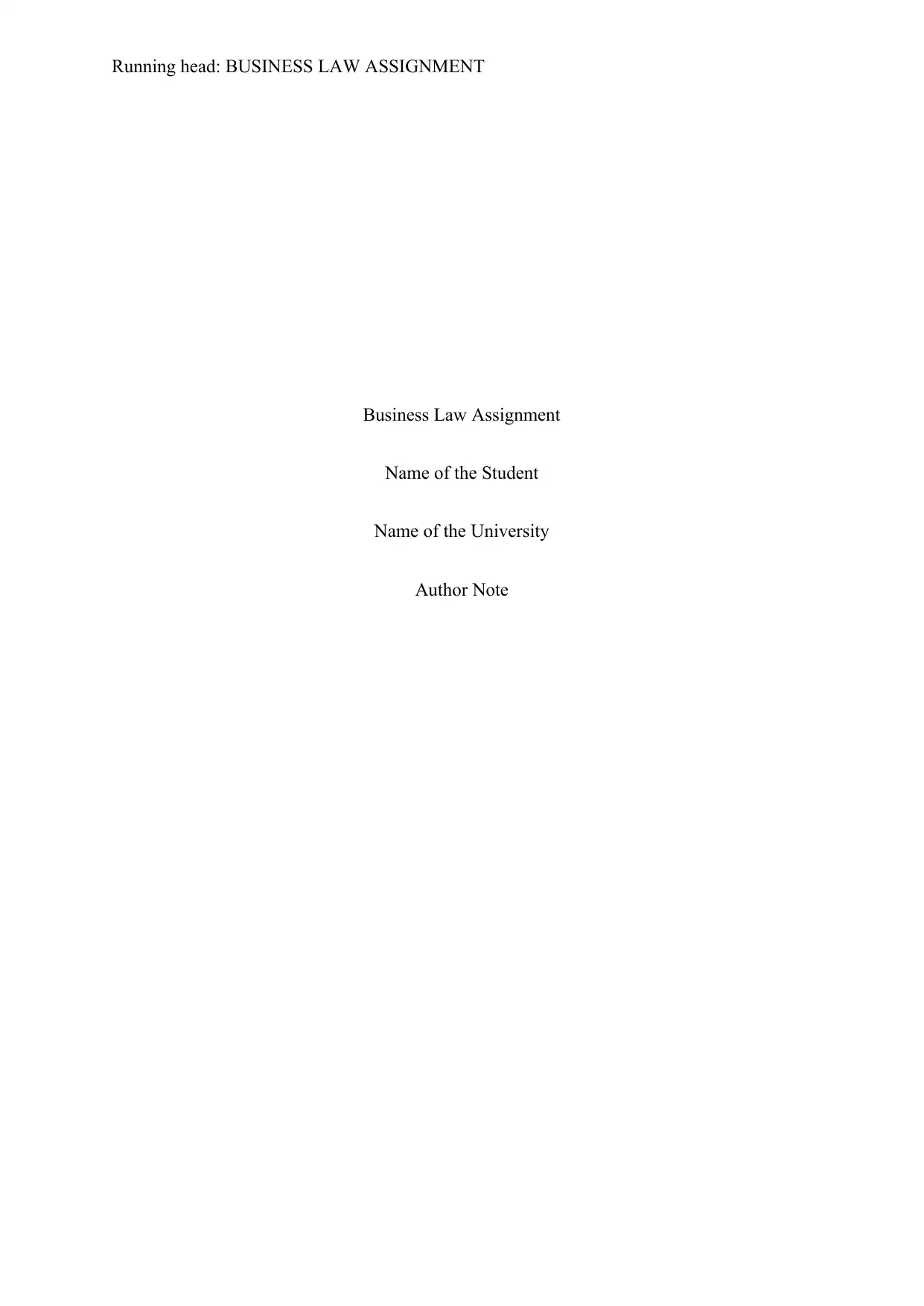
Running head: BUSINESS LAW ASSIGNMENT
Business Law Assignment
Name of the Student
Name of the University
Author Note
Business Law Assignment
Name of the Student
Name of the University
Author Note
Paraphrase This Document
Need a fresh take? Get an instant paraphrase of this document with our AI Paraphraser
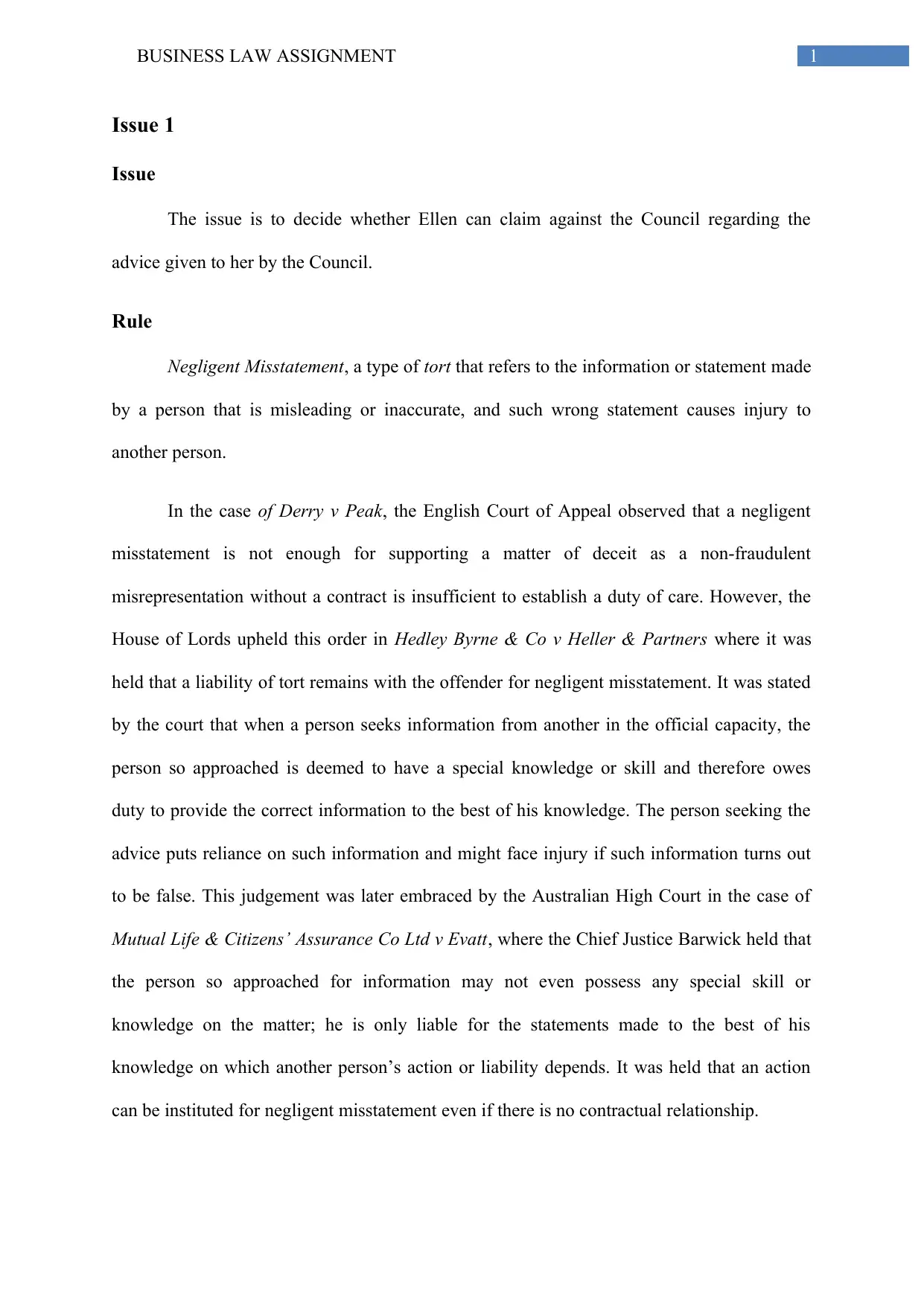
1BUSINESS LAW ASSIGNMENT
Issue 1
Issue
The issue is to decide whether Ellen can claim against the Council regarding the
advice given to her by the Council.
Rule
Negligent Misstatement, a type of tort that refers to the information or statement made
by a person that is misleading or inaccurate, and such wrong statement causes injury to
another person.
In the case of Derry v Peak, the English Court of Appeal observed that a negligent
misstatement is not enough for supporting a matter of deceit as a non-fraudulent
misrepresentation without a contract is insufficient to establish a duty of care. However, the
House of Lords upheld this order in Hedley Byrne & Co v Heller & Partners where it was
held that a liability of tort remains with the offender for negligent misstatement. It was stated
by the court that when a person seeks information from another in the official capacity, the
person so approached is deemed to have a special knowledge or skill and therefore owes
duty to provide the correct information to the best of his knowledge. The person seeking the
advice puts reliance on such information and might face injury if such information turns out
to be false. This judgement was later embraced by the Australian High Court in the case of
Mutual Life & Citizens’ Assurance Co Ltd v Evatt, where the Chief Justice Barwick held that
the person so approached for information may not even possess any special skill or
knowledge on the matter; he is only liable for the statements made to the best of his
knowledge on which another person’s action or liability depends. It was held that an action
can be instituted for negligent misstatement even if there is no contractual relationship.
Issue 1
Issue
The issue is to decide whether Ellen can claim against the Council regarding the
advice given to her by the Council.
Rule
Negligent Misstatement, a type of tort that refers to the information or statement made
by a person that is misleading or inaccurate, and such wrong statement causes injury to
another person.
In the case of Derry v Peak, the English Court of Appeal observed that a negligent
misstatement is not enough for supporting a matter of deceit as a non-fraudulent
misrepresentation without a contract is insufficient to establish a duty of care. However, the
House of Lords upheld this order in Hedley Byrne & Co v Heller & Partners where it was
held that a liability of tort remains with the offender for negligent misstatement. It was stated
by the court that when a person seeks information from another in the official capacity, the
person so approached is deemed to have a special knowledge or skill and therefore owes
duty to provide the correct information to the best of his knowledge. The person seeking the
advice puts reliance on such information and might face injury if such information turns out
to be false. This judgement was later embraced by the Australian High Court in the case of
Mutual Life & Citizens’ Assurance Co Ltd v Evatt, where the Chief Justice Barwick held that
the person so approached for information may not even possess any special skill or
knowledge on the matter; he is only liable for the statements made to the best of his
knowledge on which another person’s action or liability depends. It was held that an action
can be instituted for negligent misstatement even if there is no contractual relationship.
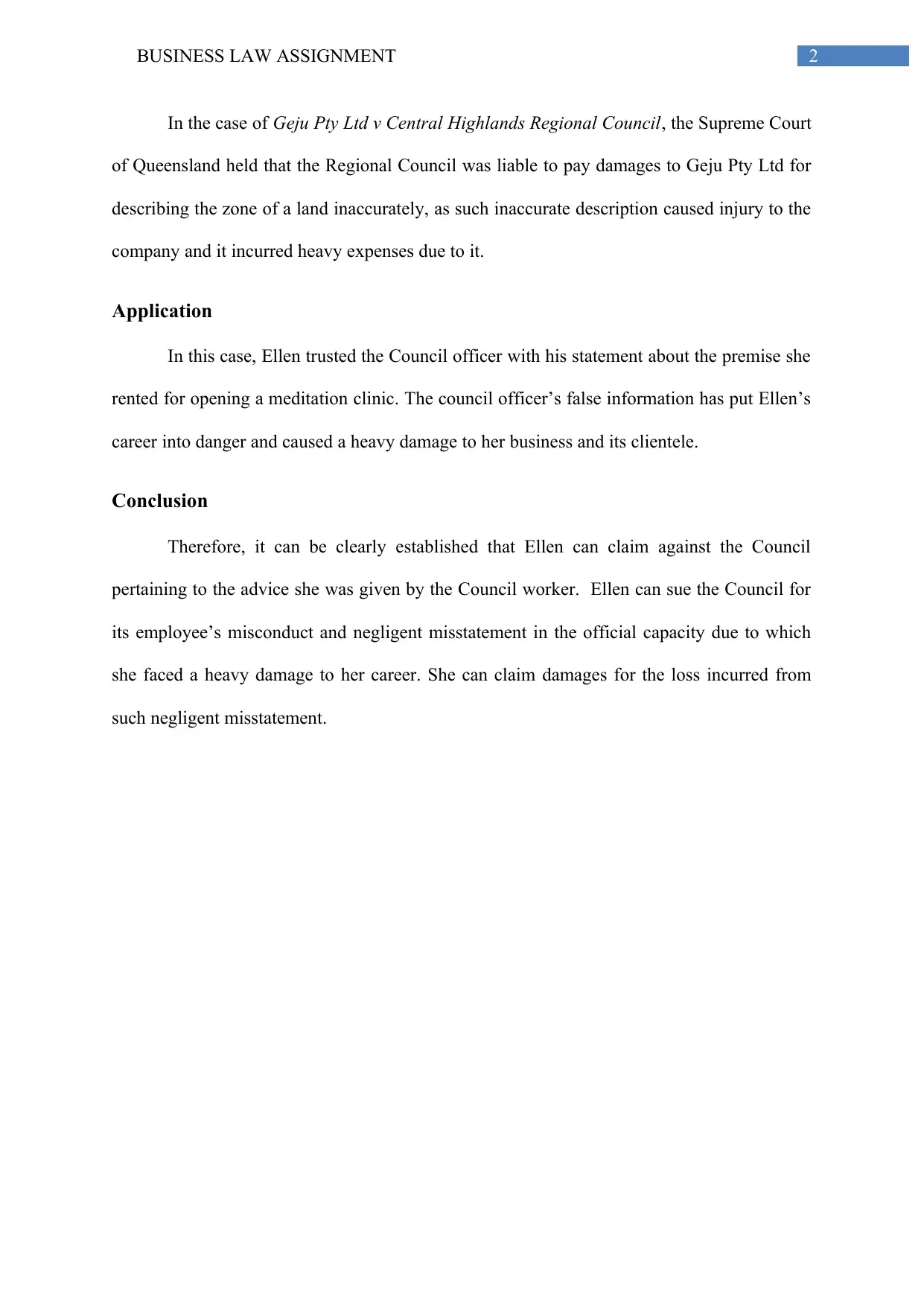
2BUSINESS LAW ASSIGNMENT
In the case of Geju Pty Ltd v Central Highlands Regional Council, the Supreme Court
of Queensland held that the Regional Council was liable to pay damages to Geju Pty Ltd for
describing the zone of a land inaccurately, as such inaccurate description caused injury to the
company and it incurred heavy expenses due to it.
Application
In this case, Ellen trusted the Council officer with his statement about the premise she
rented for opening a meditation clinic. The council officer’s false information has put Ellen’s
career into danger and caused a heavy damage to her business and its clientele.
Conclusion
Therefore, it can be clearly established that Ellen can claim against the Council
pertaining to the advice she was given by the Council worker. Ellen can sue the Council for
its employee’s misconduct and negligent misstatement in the official capacity due to which
she faced a heavy damage to her career. She can claim damages for the loss incurred from
such negligent misstatement.
In the case of Geju Pty Ltd v Central Highlands Regional Council, the Supreme Court
of Queensland held that the Regional Council was liable to pay damages to Geju Pty Ltd for
describing the zone of a land inaccurately, as such inaccurate description caused injury to the
company and it incurred heavy expenses due to it.
Application
In this case, Ellen trusted the Council officer with his statement about the premise she
rented for opening a meditation clinic. The council officer’s false information has put Ellen’s
career into danger and caused a heavy damage to her business and its clientele.
Conclusion
Therefore, it can be clearly established that Ellen can claim against the Council
pertaining to the advice she was given by the Council worker. Ellen can sue the Council for
its employee’s misconduct and negligent misstatement in the official capacity due to which
she faced a heavy damage to her career. She can claim damages for the loss incurred from
such negligent misstatement.
⊘ This is a preview!⊘
Do you want full access?
Subscribe today to unlock all pages.

Trusted by 1+ million students worldwide
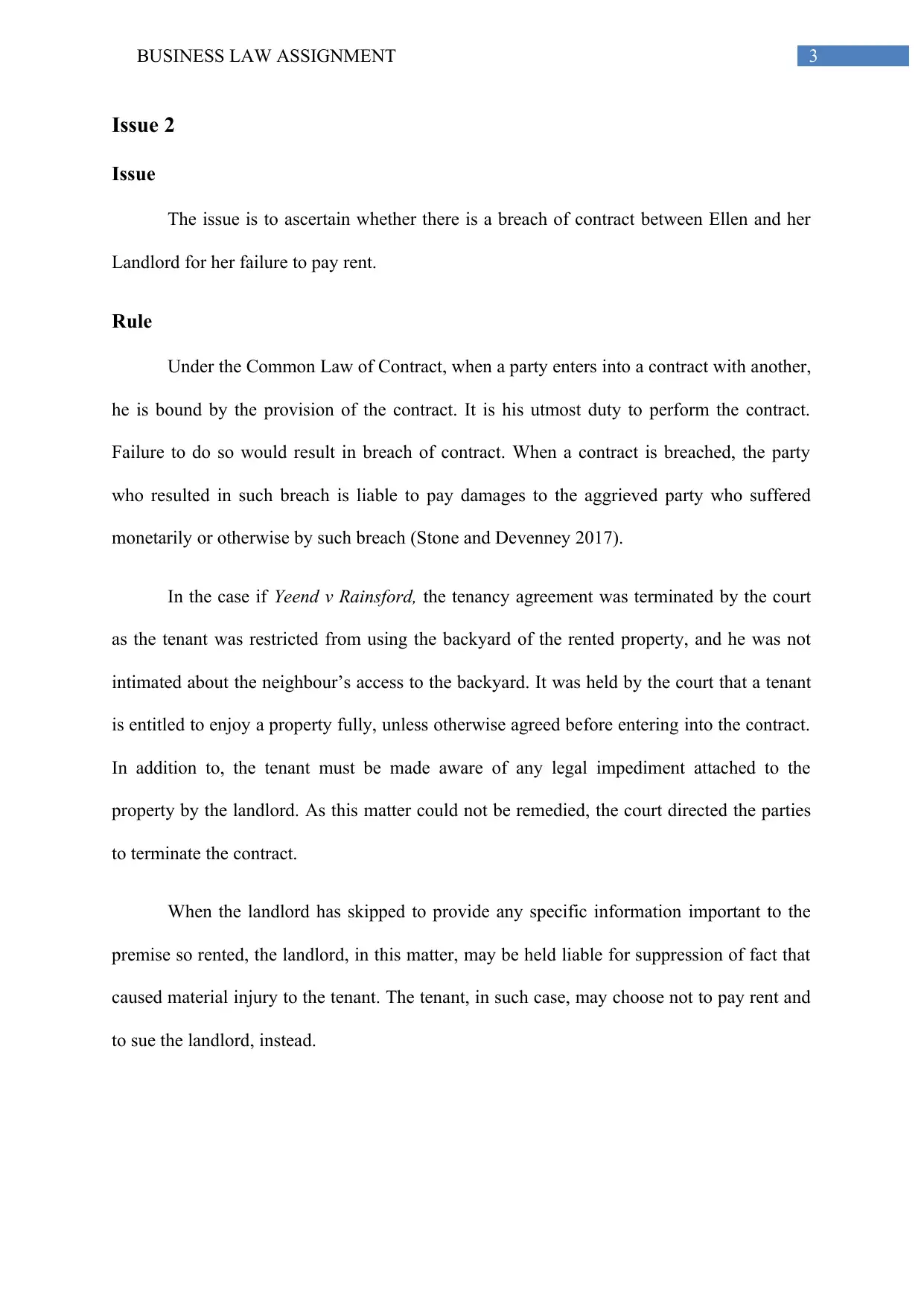
3BUSINESS LAW ASSIGNMENT
Issue 2
Issue
The issue is to ascertain whether there is a breach of contract between Ellen and her
Landlord for her failure to pay rent.
Rule
Under the Common Law of Contract, when a party enters into a contract with another,
he is bound by the provision of the contract. It is his utmost duty to perform the contract.
Failure to do so would result in breach of contract. When a contract is breached, the party
who resulted in such breach is liable to pay damages to the aggrieved party who suffered
monetarily or otherwise by such breach (Stone and Devenney 2017).
In the case if Yeend v Rainsford, the tenancy agreement was terminated by the court
as the tenant was restricted from using the backyard of the rented property, and he was not
intimated about the neighbour’s access to the backyard. It was held by the court that a tenant
is entitled to enjoy a property fully, unless otherwise agreed before entering into the contract.
In addition to, the tenant must be made aware of any legal impediment attached to the
property by the landlord. As this matter could not be remedied, the court directed the parties
to terminate the contract.
When the landlord has skipped to provide any specific information important to the
premise so rented, the landlord, in this matter, may be held liable for suppression of fact that
caused material injury to the tenant. The tenant, in such case, may choose not to pay rent and
to sue the landlord, instead.
Issue 2
Issue
The issue is to ascertain whether there is a breach of contract between Ellen and her
Landlord for her failure to pay rent.
Rule
Under the Common Law of Contract, when a party enters into a contract with another,
he is bound by the provision of the contract. It is his utmost duty to perform the contract.
Failure to do so would result in breach of contract. When a contract is breached, the party
who resulted in such breach is liable to pay damages to the aggrieved party who suffered
monetarily or otherwise by such breach (Stone and Devenney 2017).
In the case if Yeend v Rainsford, the tenancy agreement was terminated by the court
as the tenant was restricted from using the backyard of the rented property, and he was not
intimated about the neighbour’s access to the backyard. It was held by the court that a tenant
is entitled to enjoy a property fully, unless otherwise agreed before entering into the contract.
In addition to, the tenant must be made aware of any legal impediment attached to the
property by the landlord. As this matter could not be remedied, the court directed the parties
to terminate the contract.
When the landlord has skipped to provide any specific information important to the
premise so rented, the landlord, in this matter, may be held liable for suppression of fact that
caused material injury to the tenant. The tenant, in such case, may choose not to pay rent and
to sue the landlord, instead.
Paraphrase This Document
Need a fresh take? Get an instant paraphrase of this document with our AI Paraphraser
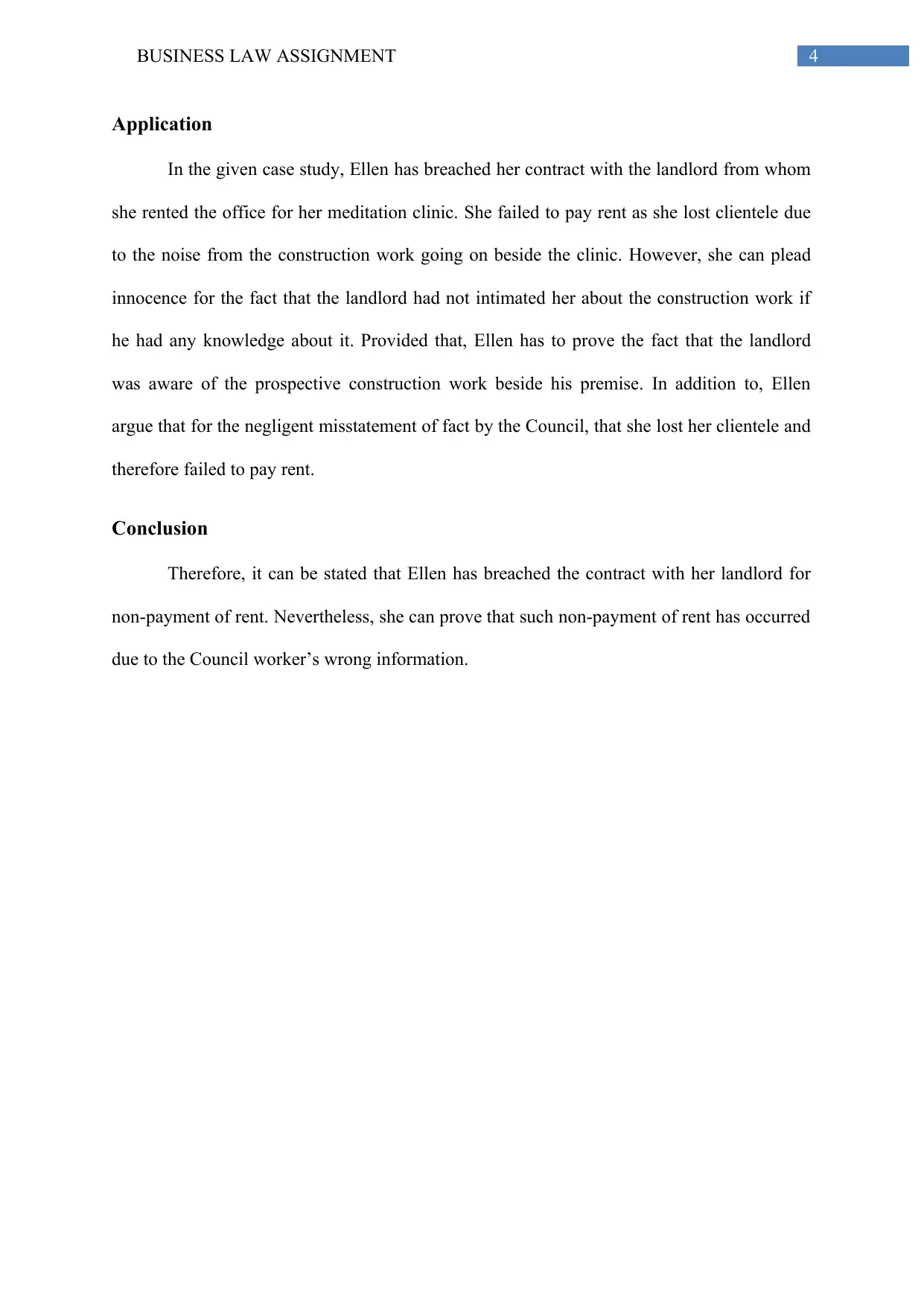
4BUSINESS LAW ASSIGNMENT
Application
In the given case study, Ellen has breached her contract with the landlord from whom
she rented the office for her meditation clinic. She failed to pay rent as she lost clientele due
to the noise from the construction work going on beside the clinic. However, she can plead
innocence for the fact that the landlord had not intimated her about the construction work if
he had any knowledge about it. Provided that, Ellen has to prove the fact that the landlord
was aware of the prospective construction work beside his premise. In addition to, Ellen
argue that for the negligent misstatement of fact by the Council, that she lost her clientele and
therefore failed to pay rent.
Conclusion
Therefore, it can be stated that Ellen has breached the contract with her landlord for
non-payment of rent. Nevertheless, she can prove that such non-payment of rent has occurred
due to the Council worker’s wrong information.
Application
In the given case study, Ellen has breached her contract with the landlord from whom
she rented the office for her meditation clinic. She failed to pay rent as she lost clientele due
to the noise from the construction work going on beside the clinic. However, she can plead
innocence for the fact that the landlord had not intimated her about the construction work if
he had any knowledge about it. Provided that, Ellen has to prove the fact that the landlord
was aware of the prospective construction work beside his premise. In addition to, Ellen
argue that for the negligent misstatement of fact by the Council, that she lost her clientele and
therefore failed to pay rent.
Conclusion
Therefore, it can be stated that Ellen has breached the contract with her landlord for
non-payment of rent. Nevertheless, she can prove that such non-payment of rent has occurred
due to the Council worker’s wrong information.
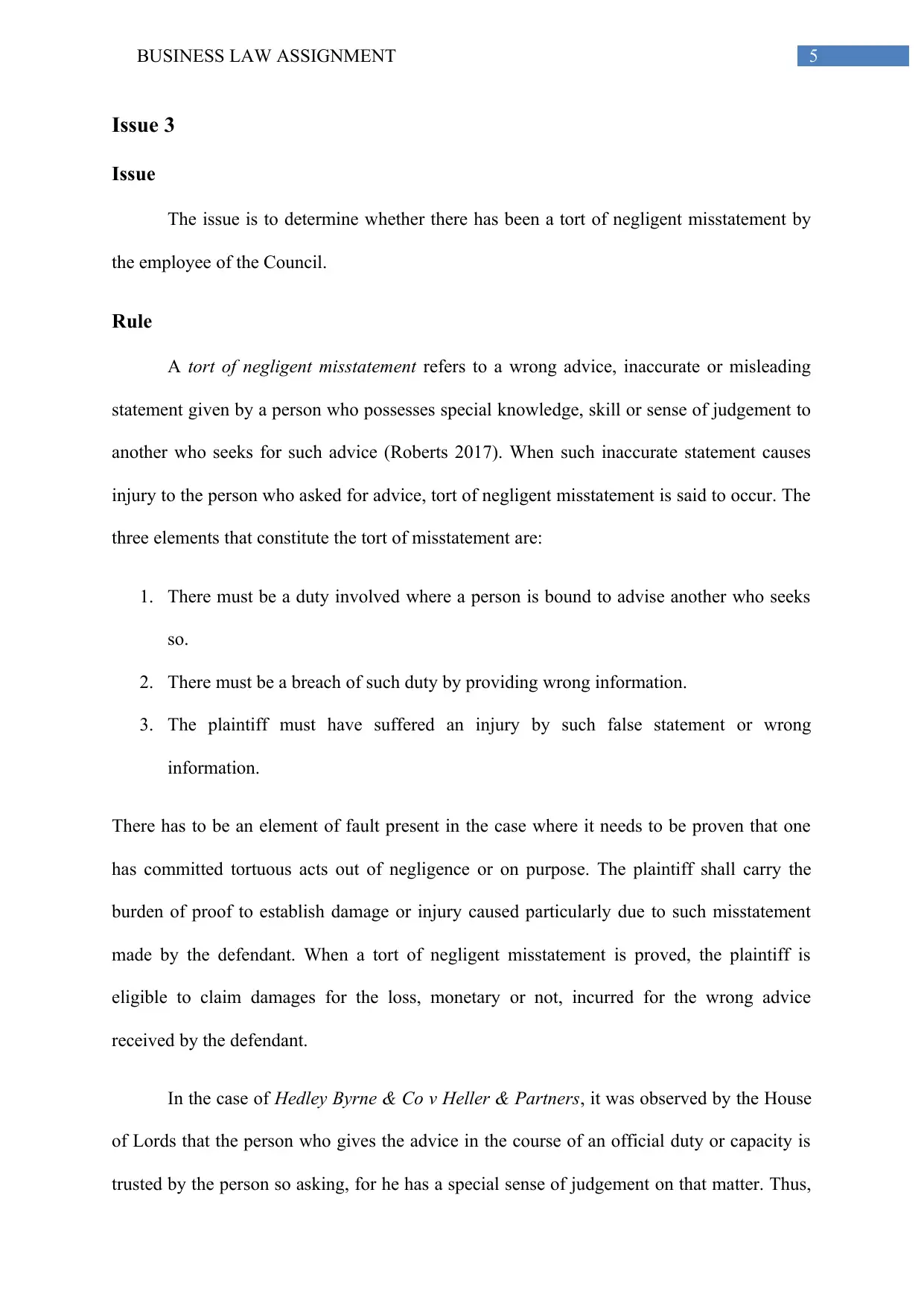
5BUSINESS LAW ASSIGNMENT
Issue 3
Issue
The issue is to determine whether there has been a tort of negligent misstatement by
the employee of the Council.
Rule
A tort of negligent misstatement refers to a wrong advice, inaccurate or misleading
statement given by a person who possesses special knowledge, skill or sense of judgement to
another who seeks for such advice (Roberts 2017). When such inaccurate statement causes
injury to the person who asked for advice, tort of negligent misstatement is said to occur. The
three elements that constitute the tort of misstatement are:
1. There must be a duty involved where a person is bound to advise another who seeks
so.
2. There must be a breach of such duty by providing wrong information.
3. The plaintiff must have suffered an injury by such false statement or wrong
information.
There has to be an element of fault present in the case where it needs to be proven that one
has committed tortuous acts out of negligence or on purpose. The plaintiff shall carry the
burden of proof to establish damage or injury caused particularly due to such misstatement
made by the defendant. When a tort of negligent misstatement is proved, the plaintiff is
eligible to claim damages for the loss, monetary or not, incurred for the wrong advice
received by the defendant.
In the case of Hedley Byrne & Co v Heller & Partners, it was observed by the House
of Lords that the person who gives the advice in the course of an official duty or capacity is
trusted by the person so asking, for he has a special sense of judgement on that matter. Thus,
Issue 3
Issue
The issue is to determine whether there has been a tort of negligent misstatement by
the employee of the Council.
Rule
A tort of negligent misstatement refers to a wrong advice, inaccurate or misleading
statement given by a person who possesses special knowledge, skill or sense of judgement to
another who seeks for such advice (Roberts 2017). When such inaccurate statement causes
injury to the person who asked for advice, tort of negligent misstatement is said to occur. The
three elements that constitute the tort of misstatement are:
1. There must be a duty involved where a person is bound to advise another who seeks
so.
2. There must be a breach of such duty by providing wrong information.
3. The plaintiff must have suffered an injury by such false statement or wrong
information.
There has to be an element of fault present in the case where it needs to be proven that one
has committed tortuous acts out of negligence or on purpose. The plaintiff shall carry the
burden of proof to establish damage or injury caused particularly due to such misstatement
made by the defendant. When a tort of negligent misstatement is proved, the plaintiff is
eligible to claim damages for the loss, monetary or not, incurred for the wrong advice
received by the defendant.
In the case of Hedley Byrne & Co v Heller & Partners, it was observed by the House
of Lords that the person who gives the advice in the course of an official duty or capacity is
trusted by the person so asking, for he has a special sense of judgement on that matter. Thus,
⊘ This is a preview!⊘
Do you want full access?
Subscribe today to unlock all pages.

Trusted by 1+ million students worldwide
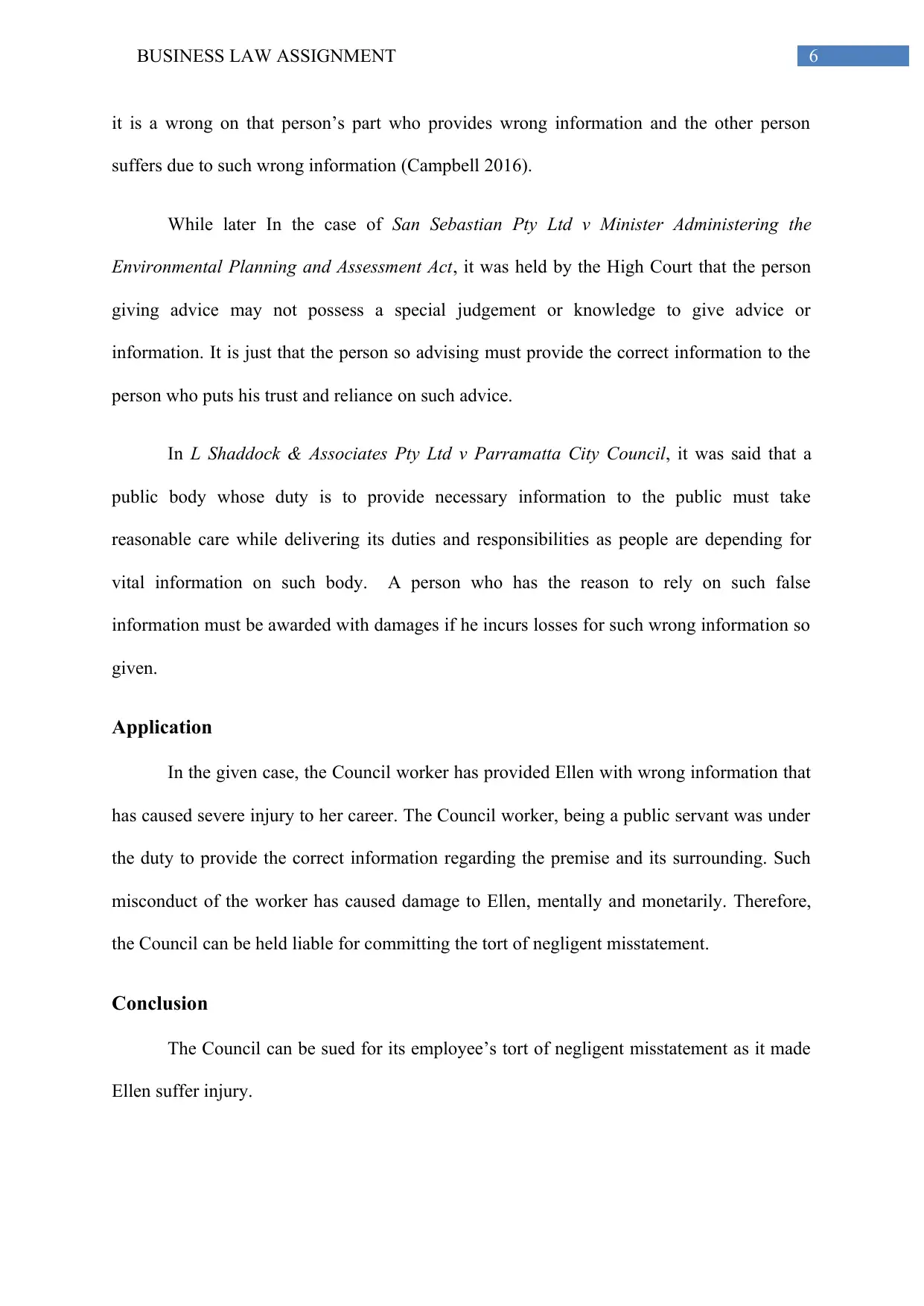
6BUSINESS LAW ASSIGNMENT
it is a wrong on that person’s part who provides wrong information and the other person
suffers due to such wrong information (Campbell 2016).
While later In the case of San Sebastian Pty Ltd v Minister Administering the
Environmental Planning and Assessment Act, it was held by the High Court that the person
giving advice may not possess a special judgement or knowledge to give advice or
information. It is just that the person so advising must provide the correct information to the
person who puts his trust and reliance on such advice.
In L Shaddock & Associates Pty Ltd v Parramatta City Council, it was said that a
public body whose duty is to provide necessary information to the public must take
reasonable care while delivering its duties and responsibilities as people are depending for
vital information on such body. A person who has the reason to rely on such false
information must be awarded with damages if he incurs losses for such wrong information so
given.
Application
In the given case, the Council worker has provided Ellen with wrong information that
has caused severe injury to her career. The Council worker, being a public servant was under
the duty to provide the correct information regarding the premise and its surrounding. Such
misconduct of the worker has caused damage to Ellen, mentally and monetarily. Therefore,
the Council can be held liable for committing the tort of negligent misstatement.
Conclusion
The Council can be sued for its employee’s tort of negligent misstatement as it made
Ellen suffer injury.
it is a wrong on that person’s part who provides wrong information and the other person
suffers due to such wrong information (Campbell 2016).
While later In the case of San Sebastian Pty Ltd v Minister Administering the
Environmental Planning and Assessment Act, it was held by the High Court that the person
giving advice may not possess a special judgement or knowledge to give advice or
information. It is just that the person so advising must provide the correct information to the
person who puts his trust and reliance on such advice.
In L Shaddock & Associates Pty Ltd v Parramatta City Council, it was said that a
public body whose duty is to provide necessary information to the public must take
reasonable care while delivering its duties and responsibilities as people are depending for
vital information on such body. A person who has the reason to rely on such false
information must be awarded with damages if he incurs losses for such wrong information so
given.
Application
In the given case, the Council worker has provided Ellen with wrong information that
has caused severe injury to her career. The Council worker, being a public servant was under
the duty to provide the correct information regarding the premise and its surrounding. Such
misconduct of the worker has caused damage to Ellen, mentally and monetarily. Therefore,
the Council can be held liable for committing the tort of negligent misstatement.
Conclusion
The Council can be sued for its employee’s tort of negligent misstatement as it made
Ellen suffer injury.
Paraphrase This Document
Need a fresh take? Get an instant paraphrase of this document with our AI Paraphraser
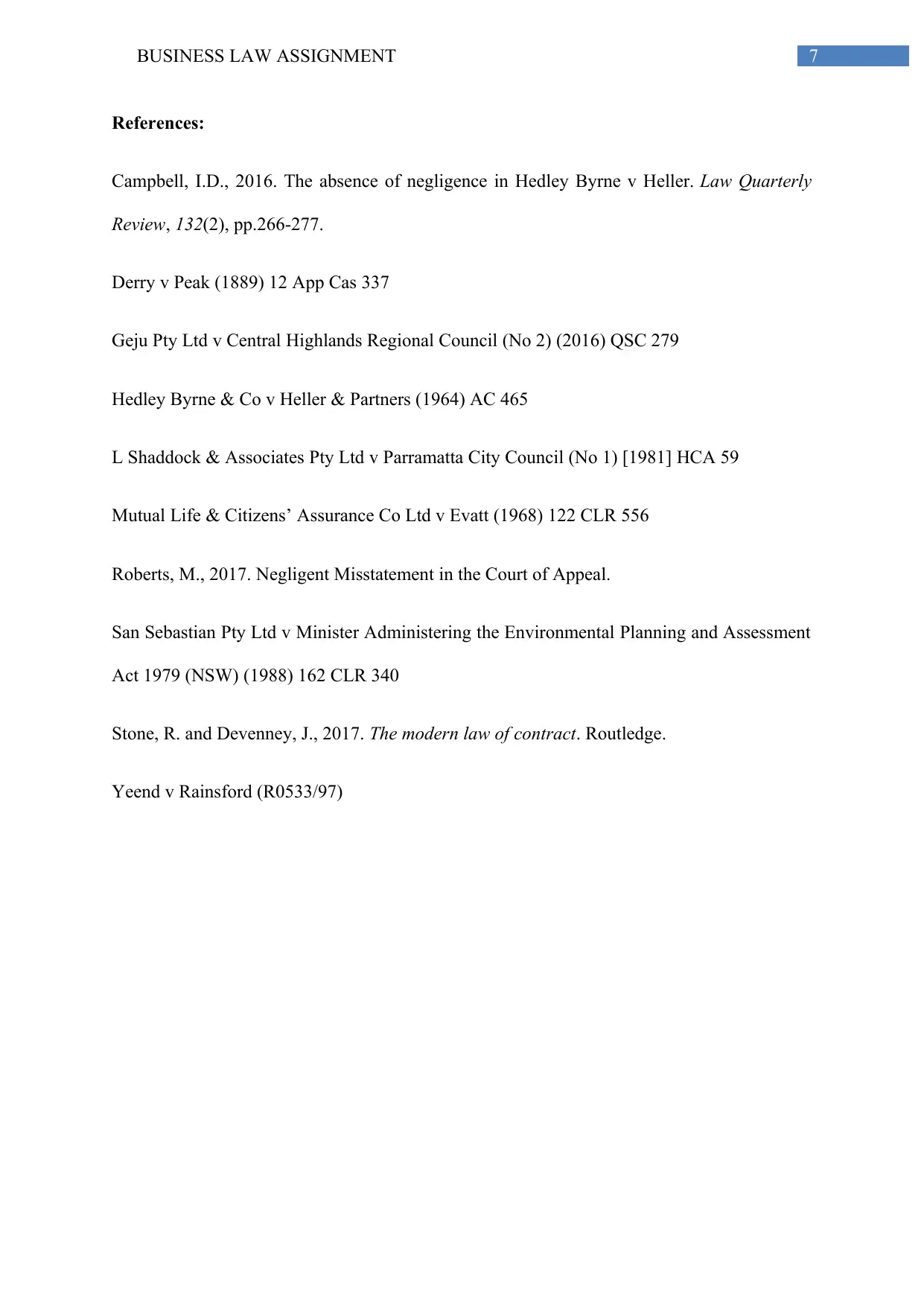
7BUSINESS LAW ASSIGNMENT
References:
Campbell, I.D., 2016. The absence of negligence in Hedley Byrne v Heller. Law Quarterly
Review, 132(2), pp.266-277.
Derry v Peak (1889) 12 App Cas 337
Geju Pty Ltd v Central Highlands Regional Council (No 2) (2016) QSC 279
Hedley Byrne & Co v Heller & Partners (1964) AC 465
L Shaddock & Associates Pty Ltd v Parramatta City Council (No 1) [1981] HCA 59
Mutual Life & Citizens’ Assurance Co Ltd v Evatt (1968) 122 CLR 556
Roberts, M., 2017. Negligent Misstatement in the Court of Appeal.
San Sebastian Pty Ltd v Minister Administering the Environmental Planning and Assessment
Act 1979 (NSW) (1988) 162 CLR 340
Stone, R. and Devenney, J., 2017. The modern law of contract. Routledge.
Yeend v Rainsford (R0533/97)
References:
Campbell, I.D., 2016. The absence of negligence in Hedley Byrne v Heller. Law Quarterly
Review, 132(2), pp.266-277.
Derry v Peak (1889) 12 App Cas 337
Geju Pty Ltd v Central Highlands Regional Council (No 2) (2016) QSC 279
Hedley Byrne & Co v Heller & Partners (1964) AC 465
L Shaddock & Associates Pty Ltd v Parramatta City Council (No 1) [1981] HCA 59
Mutual Life & Citizens’ Assurance Co Ltd v Evatt (1968) 122 CLR 556
Roberts, M., 2017. Negligent Misstatement in the Court of Appeal.
San Sebastian Pty Ltd v Minister Administering the Environmental Planning and Assessment
Act 1979 (NSW) (1988) 162 CLR 340
Stone, R. and Devenney, J., 2017. The modern law of contract. Routledge.
Yeend v Rainsford (R0533/97)
1 out of 8
Related Documents
Your All-in-One AI-Powered Toolkit for Academic Success.
+13062052269
info@desklib.com
Available 24*7 on WhatsApp / Email
![[object Object]](/_next/static/media/star-bottom.7253800d.svg)
Unlock your academic potential
Copyright © 2020–2026 A2Z Services. All Rights Reserved. Developed and managed by ZUCOL.





